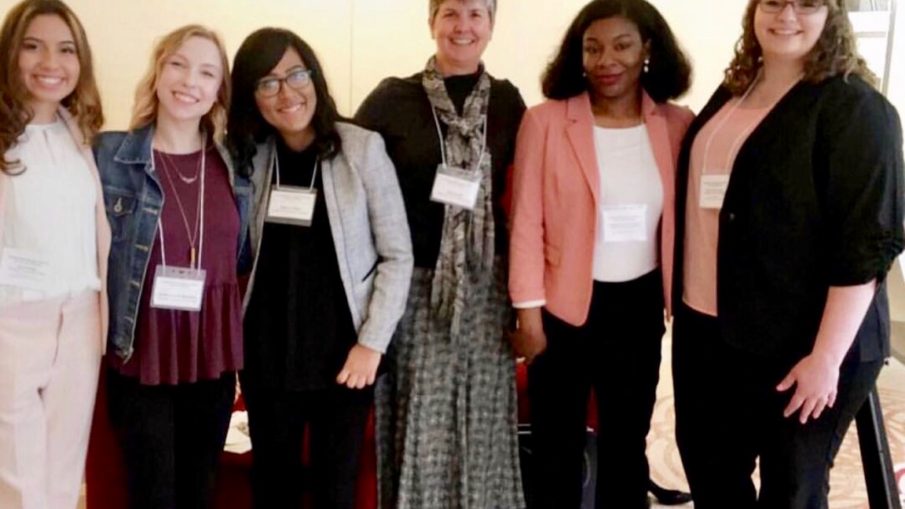Five students from Frederick Community College ventured up to Philadelphia along with many other young academics to bring light to the rising social problems in society today.
On Feb. 27, Andrea Constant, Rocio Mejia, Raquel Alfaro, Katherine Muellerklein, and Taylor Cooley, all attended the Eastern Sociology Society Conference along with sociology professor, Dr. Jill Schultz. The conference was held at the Sheraton Hotel in downtown Philadelphia. The theme of this year’s conference was, “Is This the End of the World as We Know It?” All students worked on a specific social issue of their choice where they then, upon acceptance to the conference, presented their research via poster presentations at the conference. Schultz also presented at the conference where she participated on a panel discussion.
Panel discussions, paper presentations, poster presentations, and round-table discussions were just some of the many opportunities that were readily available for all the attendees. The group of students all presented a variety of topics among many other scientific and sociological research presentations.
Constant, who has recently graduated from FCC with her associate degree in social work, presented her social problem titled, “Zero Tolerance Policies: A Social Problem Affecting Americas Children,” which explored the current criminal justice system alongside the education system for America’s youth.
“Being able to interact with other students about their posters…was very insightful,” Constant said.
Constant, who said she had participated at the 2016 FCC Honors Forum, explained that the ESS Conference was the first time she had ever presented out of state.
She would definitely recommend this opportunity to other students as she encourages them to try new things by saying, “Do not be defeated by your own educational faults or struggles. There are opportunities everywhere.”
Current sophomore, Rocio Mejia, also presented at the conference with her project regarding the current debate over religious security with her presentation titled, “Policing the Veil: Nationalism, Security, Religion, or Gender Discrimination.” This was Mejia’s first time attending an event like this conference.
She enjoyed how helpful it was for meeting new people saying, “You can meet people who can help you expand your project.”
At the conference, many different professors from various universities such as University of Nebraska, University of Miami, various universities from New York and many more, walked around and surveyed students work. By offering conversation and questioning, students were able to reflect on their work.
Mejia, who enjoyed the environment said, “You feel important.”
For the poster presentations, there were various sessions at different times to help with the organization of all the undergraduate students that attended the conference. In the session that the young women were presenting in, there were several research projects that covered similar issues. Alfaro, who presented on “Transgender Bathroom Equality with School Systems” and Muellerklein, who presented on the “Applying the Best Model to the Dakota Access Pipeline,” were some of the students that chose to present on similar and popular issues. Even though the two young women among others had the same general topic, each presentation was different in what it focused on.
“It allowed me to bring my social issue into light with others and experience a new environment I’ve never been in before,” Alfaro said.
Muellerklein, who was also a first-time participant in this conference, said that “it was an overall enjoyable experience” and is planning on trying to submit something for next year’s conference, which will be held in Baltimore.
“I feel incredibly honored to have been able to present my research at this conference,” Muellerklein said.
Smiles were exchanged and overall successes were celebrated at the end of the day at the conference. When the students were reunited with Schultz after the session was over, they all gave high-fives and hugs all around, celebrating this special moment in their academic careers. All the students explained they were grateful that Dr. Schultz pushed them and believed in them to apply for this conference.
“Being able to have Dr. Schultz as a professor and telling us about this opportunity was a blessing,” Constant said.
By society providing opportunities like this conference, it allowed students to reach outside of the typical classroom presentation and push themselves towards higher academic thinking. With hard work and dedication and the help of Schultz, the young women showcased their work and were able to bring light to others regarding the current social problems of today.

